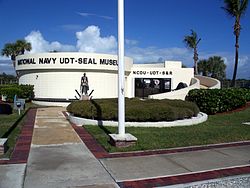- National Navy UDT-SEAL Museum
-
Coordinates: 27°29′43″N 80°18′01″W / 27.495249°N 80.300307°W
National Navy UDT-SEAL Museum 
Established 1985 Location 3300 North A1A
North Hutchinson Island
Fort Pierce, FloridaType Military History[1] Director Captain Michael R. Howard, USN (Ret)[1] Curator Ruth McSween[1] Website www.navysealmuseum.com The National Navy UDT-SEAL Museum, also known as the Navy UDT-SEAL Museum, is located at 3300 North A1A, North Hutchinson Island, in St. Lucie County, just outside Fort Pierce, Florida. It houses exhibits to inform and educate on the role of Navy Underwater Demolition Teams (UDT) and Sea, Air, Land (SEAL) teams.[1] The museum also preserves the history of the SEALs (the original Navy frogmen first trained outside of Fort Pierce).
The idea of the museum originated in the home of Albert Stankie, where he and other former UDT Frogmen gathered personal artifacts and experiences from their service in World War II. They worked to procure the defunct Ft. Pierce Treasure Museum building and site. This evolved into a dedicated facility, which opened in 1985, and was recognized as a National Museum by an act of Congress signed into law February 7, 2008.[2]
Contents
UDT-SEAL Memorial
The focal point of the Museum is the UDT-SEAL Memorial, the only Memorial in the world dedicated exclusively to the United States Navy SEALs and their predecessors.[3] The Memorial consists of a 500-pound, 9-foot-tall, bronze sculpture of a modern Navy SEAL. The names of all Underwater Demolition Team members — the "Frogmen" of World War II and modern Navy SEALs — who have died in the service of the country are carved into black, granite panels on the walls surrounding the sculpture and its reflecting pool.[4]
Other notable exhibits
The Museum collection includes a number of rare artifacts dating from the founding of the SEALs, from the days of Scouts & Raiders, through the Underwater Demolition Teams, to recent present-day activities of US Navy SEALs:
- Original World War II-era obstacles used for demolition training prior to the Normandy landings ("D-Day").
- LCPL "the Shark Tooth Boat" used by the UDT in the Pacific Ocean theatre of World War II during the Korean War.
- Patrol Boat River PBR, used during the Vietnam era. These boats had a shallow draft and jet drive making them ideal for insertion and extraction in the rivers and canals of the region.
- Apollo space crafts—the actual training devices used by the UDT "frogmen" recovery Teams during the Apollo, Gemini, and Mercury space missions.
- SEAL Delivery Vehicles or SDVs, specifically the MK XII MOD 0, the MARK IX (9), and the MARK VII (7) MOD ), which are mini-subs that flood inside (the operators wear oxygen tanks). These SDVs are used to clandestinely enter enemy harbors.
- Various SEAL vehicles from operations in Kuwait, Afghanistan, and Iraq.
- The Alabama Maersk lifeboat aboard which Somali pirates held Captain Richard Phillips hostage.
- A wall honoring Medal of Honor recipients, with the citations for each one.
- Rare artifacts, equipment and weapons from the founding years during WWII through current engagements in Afghanistan.
Annual UDT-SEAL muster ceremony
Each Veteran's Day weekend, the Museum holds a three-day tribute to UDT and SEAL veterans, that includes demonstrations and exhibitions.
Notes
- ^ a b c d MuseumsUSA. "Navy UDT-SEAL Museum Fort Pierce, Florida", MuseumsUSA website, 2007. Retrieved on October 25, 2007.
- ^ sarah.dase (February 7, 2008). "Ft. Pierce Museum Now the Official National Museum of Navy SEALs and Their Predecessors". NavySEALs.com (a private web community of SEA Air Land athletes and Navy SEAL supporters). http://www.navyseals.com/ft-pierce-museum-now-official-national-museum-navy-seals-and-their-predecessors. Retrieved 2011-01-11.
- ^ Crankshaw, Joe (May 28, 2010). "Navy SEAL Museum in Fort Pierce unveils 9-foot-tall sculpture". TC Palm. Scripps Interactive Newspapers Group. http://www.tcpalm.com/news/2010/may/28/navy-seal-museum-in-fort-pierce-unveils-9-foot. Retrieved 2011-01-11.
- ^ Memorial exclusively for US Navy SEALs to be Dedicated. August 3, 2010. National Navy UDT-SEAL Museum website. Retrieved 2011-01-11.
External links
- Navy SEAL-UDT Museum official website
- Muster Schedule information about the Muster
Categories:- United States Navy SEALs
- Armed forces diving
- United States Navy museums
- Military and war museums in Florida
- American national museums in Florida
- Museums in St. Lucie County, Florida
- Fort Pierce, Florida
- Museums established in 1985
Wikimedia Foundation. 2010.


